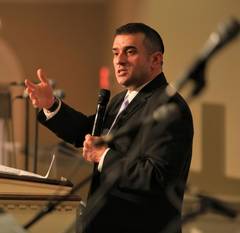- About Us
- Learning
- Resources
- Get Involved
- Membership
- Jobs
Torah of Israel and Palestine
05/20/2021 11:28:59 AM
Rabbi Brent Spodek
| Author | |
| Date Added | |
| Automatically create summary | |
| Summary |
 Dear Friends:
Dear Friends:
We just concluded the holiday of Shavuot, the commemoration of receiving the Torah in the wilderness.
Why, our tradition asks, were we not given the Torah in Egypt, at the start of our epic journey? Alternatively, perhaps it would have made more sense for us to receive the Torah at the end of our journey - the beginning of our own self-governance in the land of Israel?
Why in the wilderness?
The midrash teaches כָּל מִי שֶׁאֵינוֹ עוֹשֶׂה עַצְמוֹ הֶפְקֵר כַּמִּדְבָּר, אֵינוֹ יָכֹל לִקְנוֹת אֶת הַתּוֹרָה
To be able to receive Torah, we must make ourselves hefker: ownerless, available, unbounded like the wilderness.
At its core, the Torah asks us to be vulnerable and open-hearted.
My thoughts these days are not only in Sinai, but a mere 100 miles or so to the northeast, to Gaza and Tel Aviv, and those are very hard places to be vulnerable and open hearted.
Obviously, on the intellectual level, there is the pain of this new moment - the scope of the Palestinian rocket attacks on Israel, the increasing role of Israeli Palestinians in resisting the immoral and unjustifiable Occupation and the massive Israeli airstrikes on the already suffering population of Gaza.
However, on the heart level, there is nothing new - the origin of this current round of fighting lies far in the past.
My pain in this moment is tied with a lifetime of pain that comes from loving the deeply flawed state of Israel - the pain of praying at the Kotel for the safe return of Nachshon Waxman, the pain of Yitzak Rabin’s murder and the subsequent unraveling of the Oslo Peace efforts, the pain of remembering friends who were murdered in terrorist attacks, the pain of knowing that the self determination of my people has meant the oppression of the Palestinian people.
The news is new, and the pain is old - as old as 1973, as old as 1967, as old as 1948, as old as pogroms and Crusades. No person, or people, can stay vulnerable and open hearted for that long.
For some of us, particularly in the American Jewish community, it can be hard to be open-hearted to the reality of Palestinian suffering - millions of people displaced from their homes, without regular access to water, sanitation or electricity. There are many in our community who will quickly denounce as a kapo or self-hating Jew those who show a willingness to simply hear or recognize Palestinian suffering, let alone recognize Israeli responsibility for that suffering. When our leaders focus on policing “Jewish unity” but not “Palestinian suffering,” they debase themselves, the Jewish people and the Torah. If we refuse to recognize that the image of the Divine is present in every person, not just the Jews, if we refuse to recognize any suffering other than the suffering of Auschwitz, then it is not the Creator of Heaven and Earth that we worship, but our own idolatrous image. That Jews suffered in the Shoah is no guarantee that our behavior is righteous.
For some of us though, particularly in the progressive community, it can also be hard to be open hearted to the realities of Jewish and Israeli suffering. Those terms are not synonymous, but they are deeply linked. Many, many Israelis, including my family, became Israelis because they were the ones who weren’t murdered in the Holocaust. Israel is not principally the product of a colonial enterprise; it is the product of unspeakable and unbearable trauma. Beyond the suffering of the past, though, it is hard to recognize that Hamas, the democratically elected leaders of Gaza, are evil, routinely committing war crimes of targeting civilians and placing armaments in schools and hospitals. It can be hard to recognize that “victim” is no more synonyms with “saint” than “Jew” is with “Israeli.” That Palestinians suffer under the Occupation is no guarantee that their behavior is righteous.
There are amazing local organizations such as Bereaved Parents Circle, Encounter and Gisha that are working to advance a just peace in Israel and Palestine. It is hard for most of us to recognize that none of the major actors in this story are “good guys” - they are deeply wounded, traumatized and frightened people. From the the Holocaust through the founding of the State of Israel - which is experienced as the “Nakba” or “Catastrophe” by most Palestinians - the 20th century has taught both Jews and the Palestinians the very real dangers of literally being vulnerable. We have learned again and again the antithesis of Torah - that we must harden ourselves and reject vulnerability and open-heartedness.
I don’t live in Tel Aviv and I don’t live in Gaza. I live here, in the Hudson Valley, and I don’t want to march or proclaim or protest, insisting that my side is right and your side is wrong. I am a Jew and my fate is with the Jewish people, in our glory and in our shame. I will not abandon my people and neither will I defend the indefensible.
To the best of my ability, I want to make my heart available and unbounded like the wilderness, so that I - and perhaps all of us - might learn and teach the Torah of this moment.
With blessings,
Rabbi Brent
PS - for folks who are interested in a more detailed analysis of this moment, I personally find the direct reporting from +972 and the analysis of Leah Solomon, the Mideast Director of Encounter, to be particularly useful.
Thu, October 30 2025
8 Cheshvan 5786
RABBI BRENT SPODEK

Join Our Mailing List
Privacy Settings | Privacy Policy | Member Terms
©2025 All rights reserved. Find out more about ShulCloud


